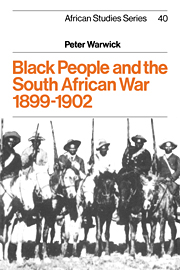Book contents
Summary
The development of diamond mining in Griqualand West from 1867 and gold mining on the Witwatersrand from 1886 produced far-reaching changes in the South African economy. Minerals attracted capital and immigrants from overseas; new markets for food were created in the thriving towns of Kimberley and Johannesburg; railways were built with revenue derived from the mining industries; the seaports developed; and manufacturing and service industries also began to grow because of the demands of the mining sector and the expansion of the domestic economy. The mining industry required capital, imported technology and skilled workers from overseas; but above all it needed a cheap and assured supply of black labour. In the gold-mining industry the price of labour was of paramount importance, especially to those mining concerns that became involved in the mid-1890s in the capital- and labour-intensive deep-level extraction of gold.
The mineral revolution in South Africa led to a growth in the demand for black labour in all industries – in mining, manufacturing, on the railways, in commercial agriculture and at the seaports. The migration of Africans to work in industry was determined by the fiscal pressures placed on them to obtain cash for taxes and rents and to provide for new consumption requirements, and by the increasing difficulties experienced by many peasants of meeting their cash needs through the sale of agricultural produce and livestock because of land shortage, soil deterioration, changing patterns of production and the pressure of population on the cultivable land available.
- Type
- Chapter
- Information
- Black People and the South African War 1899–1902 , pp. 125 - 144Publisher: Cambridge University PressPrint publication year: 1983



